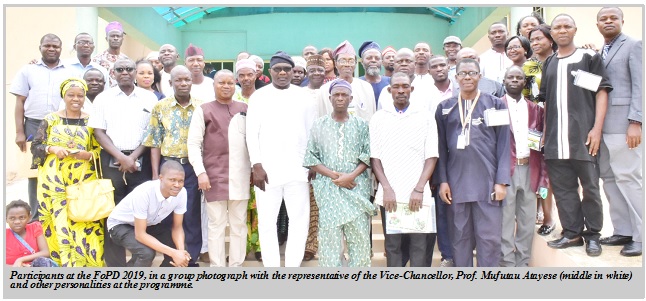Humans have been charged to value various plants around them as they play a key role in providing food, clothing, shelter and medicine for mankind. This was the take of the Director-General, Forestry Research Institute of Nigeria (FRIN), Prof. Olusola Adepoju while delivering his lecture titled “The Plant: Health and Livelihood” during the Fascination of Plants Day (FoPD) 2019, held in the Federal University of Agriculture, Abeokuta (FUNAAB).
Represented by Head, Bio-Medicinal Centre, FRIN, Dr. Ibrahim Lawal, Prof. Adepoju said that plants have formed the basis of sophisticated traditional systems that have been in existence for thousands of years and continue to provide mankind with new remedies.

According to him, “They (Plants) have therapeutic properties in any of their organs (Roots, Stem Bark, Leaves, Fruits, Seeds and possibly Flowers) and that it has been estimated that two billion people representing a third of the world’s population rely on traditional medicine, many of which come from the forest plant species and stimulants.
He posits that drug discovery from medicinal plants has traditionally been lengthier and more complicated than other drug discovery methods. According to him, recently, there has been a rekindling of interest in rediscovering natural products and that it is clear that nature has played and will continue to play a vital role in the drug discovery process.
Going down memory lane, Dr. Ibrahim Lawal said since 1999, the World Health Organisation (WHO), had published three volumes of ‘WHO’ monographs on selected medicinal plants, importance of some herbs with their medicinal values which include plants like sandalwood, ginseng red clover, burdock, bayberry and safflower used to heal wounds, sores and boils.

He said that the global market for herbal medicines currently stands at over Eighty (80) Billion (United States) Dollars annually and is growing steadily. However, he said the place of plants in medicine was radically altered in the 19th century by the application of chemical analysis, drug discovery from plants, which continued to be important through the 20th Century and the 21st Century in reference to anti-cancer drugs from Yew and Madagascar periwinkle.
Similarly, he said, “It has been estimated that more than 400 traditional plants or plant derived products have been used for the management of type 1 diabetes across the globe. Traditional systems of medicine are based on doctrine of signature – assumption that the appearance of plants may give clues to their medicinal properties”.
On the role of plant in sustainable human health, he said plant removes toxins from air through its various parts such as the leaves and bark. He also said the efficacy of herbs has been confirmed in different disease conditions all over the world and herbs have succeeded where conventional or synthetic medicine has failed, especially in chronic diseases.
Corroborating him, a don in the Department of Forestry and Wildlife Management in the university, Professor Samuel Oluwalana delivered a paper on “Plants: Sustainable Environment, Health and Livelihood”, where he emphasised on the need to exploit more medicinal plants for livelihood, while the General Manager, Lagos State Parks and Gardens Agency, Mrs. Bilikis Adebiyi-Abiola through her representative, Mrs. Halimat Adeniji delivered a lecture on “Plants: Mitigating the Effect of Climate Change”.








